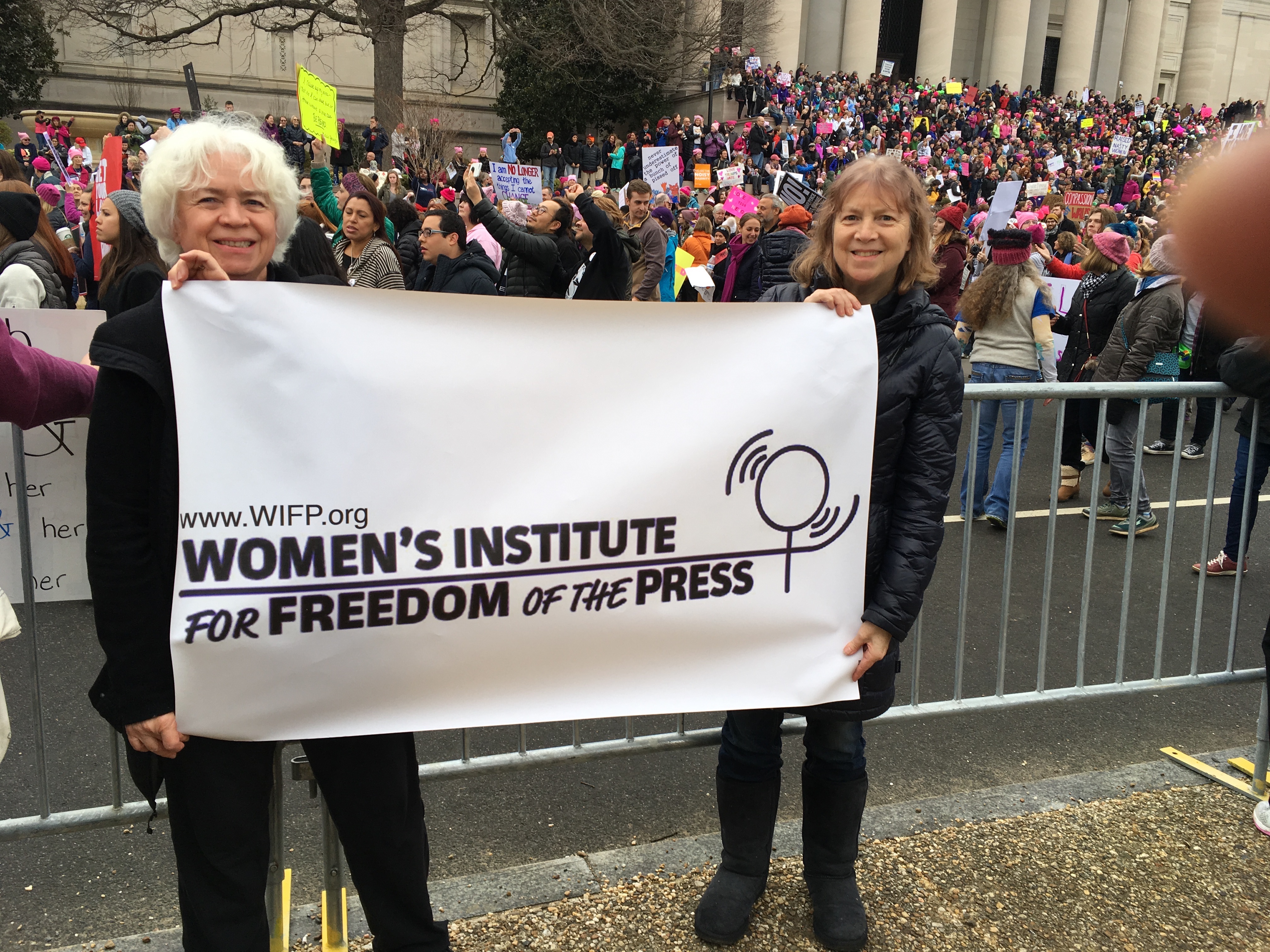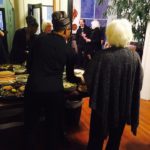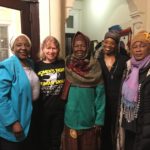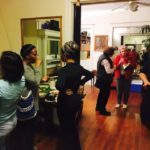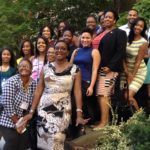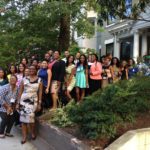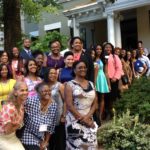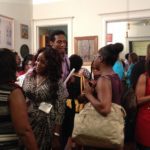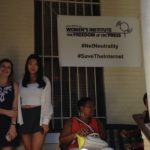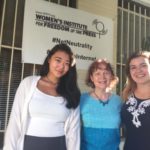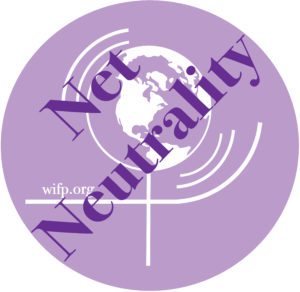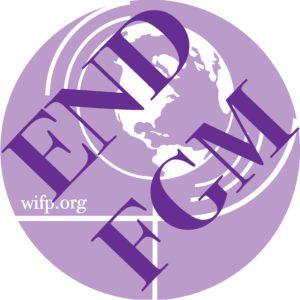Net Neutrality at Risk: Support Mobilizing Now
On May 18th the Federal Communications Commission (FCC) Chairman Ajit Pai launched a proceeding that threatens Net Neutrality. Once again individuals and organizations have mobilized to prevent the open-internet protections from being undermined.

Prior to the FCC meeting advocates for an open internet held a rally outside the FCC headquarters in support of Title II Net Neutrality rules. Speakers included Sen. Ed Markey, Sen. Ron Wyden, Rep. Barbara Lee and Rep. Jared Polis.

Organizations actively supporting Net Neutrality include the Women’s Institute for Freedom of the Press, Free Press, the Center for Media Justice, Color of Change, CREDO Action, #AllOfUs, American Family Voices, Battle for the Net, Climate Hawks Vote, Common Cause, Corporate Accountability International, Courage Campaign, Daily Kos, Demand Progress, Democracy for America, Electronic Frontier Foundation, Fight for the Future, Free Press Action Fund, MoveOn.org Civic Action, Mozilla, Other 98%, OpenMedia, PEN America, People’s Action, People Demanding Action, People For the American Way, Presente.org, Progressive Change Campaign Committee, Progressive Congress Action Fund, Public Knowledge, Rainforest Action Network, RootsAction.org, The Nation and Win Without War.
Under the Obama administration, the FCC came out in support of Net Neutrality after millions of people spoke in favor of an open internet. Now under the Republicans, the protections are at risk. Already over a million comments and signatures have been submitted opposing Chairman Pai’s scheme. Activists are mobilizing others to speak out to the FCC and Congress since we don’t have much time to prevent the overturning of the protections.

This summer will be devoted to making sure we do not lose our free and open internet. WIFP will be a part of a national effort to make sure we do not lose our ability to communicate with each other and throughout the world via the open internet. Join us or any of the many organizations that will be leading these efforts.
WIFP’s Rosie – International Women’s Day 2017
WIFP’s artistic, creative Lucy Lu:

45th Anniversary Reception – January 21, 2017
Following the Women’s March on Washington, January 21, 2017, WIFP held a reception as part of our 45th Anniversary. Associates and friends gathered for an evening of relaxing, networking, and strategizing with other out-of-town and local activists after the March. WIFP staff hosting included WIFP president Dana Densmore (from Santa Fe, NM), directors Martha Allen & Elana Anderson, almost all the board of directors (including Kimberlie Kranich from Illinois), support team (including Danielle Maldonado and Otgon Altankhuyag) and intern Brody Fernandez (University of California, Davis). As well as WIFP associates (including Ariel Dougherty, Pamela Creedon, Carolyn Byerly and Nyamsuren Munkhbat) and friends, we were joined by members of our partner organization, Global Woman Peace Foundation (including Aisha Kamara and Julie Taitt). Others joining us were many members and the president of the Inter-African Committee.
We share a few photos taken at the March and Reception.

Mongolian Media Freedom of the Press
by Otgon Altankhuyag, WIFP Associate

Mongolia became a member of the United Nations in 1961 and recognized the Universal Declaration of Human Rights, and is therefore legally bound to protect the freedom of expression in accordance with international laws and standards. Mongolian was under the communist regime ruled by Mongolian People’s Party till 1990. The society at the time was different, with restrictions imposed on the media. Since the downfall of communism and the introduction of democracy, the country faced a lot of issues related to the Constitution, as the new Constitution itself contained elements of democracy. For example, citizens were allowed to own property, they were paid proportionally to their work, and entitled to freedom of information and expression, etc., which means people start to think with an open mind and talk freely.
The First Democratic Constitution was passed in 1992, after which lawmakers started consulting the laws of developed democratic countries, drawing upon their experiences to devise laws for Mongolia.[1] The Parliament of Mongolia for the first time passed the Law on Media Freedom on 28 August 1998 in order to guarantee the rights of all Mongolian citizens as specified in the Constitution to freedom of expressing and publishing their opinions. This law, in my opinion, was a direct result of the democratic reform, which propelled Mongolian society to move forward and learn from the outside world. The Law on Media Freedom, reiterating the Constitutional, specifies that “freedom of thought, free expression of opinion, speech, press, peaceful demonstration and meetings, procedures for organizing demonstrations and other assemblies shall be determined by law,” [2] which made people realize the importance of these tenets of democracy, in that they are basic human rights and should be enjoyed by everyone regardless of their backgrounds.
Currently, Mongolia not only has domestic sources of information, such as radio and television, but also enjoys access to international media, such as foreign books and broadcasting, and social media, such as Facebook, Twitter and Google, without any law prohibiting their access. In 1990, Mongolians only had access to 10 types of media sources from which to get information, but presently, according to the Press Institute surveys of 2012-2014, about 5,000 media professionals work in 506 media outlets throughout the country. The 2014 statistics revealed that 142 TV stations, 72 radio stations, 123 newspapers, 98 magazines and 71 online media outlets were active in Mongolia, and 30% of all media outlets operated in domains outside of the capital. [3] With the latest progress of information communication technology, the number of online media users is likely to sustain a steady yearly growth, and it is likely that that media will have new appearances in the future. Good media sources are factual and well written and can serve as educational material for Mongolian society, and therefore contribute positively to legislation concerning human rights, particularly in the field of gender equality.
Since the Constitutional law and related codes were passed, Mongolian women have not only played vital economic roles in the country, but have also gained much power and joined the social elite. It should be pointed out that Mongolian women have had a long history of social prominence. For example, the Persian historian Rashid al-Din wrote that Kublai Khan’s mother Sorghaghtani Beki was “extremely intelligent and able and towered above all the women in the world.”[4] She, together with Kublai’s wife Chabi, exerted considerable influence on the policies the Mongols pursued.
Mongolian women have often benefited from government policies, which in theory guarantee equality in education, the workplace, and the political system after laws pass. Educated women have banded together to form non-governmental organizations to criminalize domestic abuse, to improve conditions for women in the labor force, to conduct research on employment, prostitution, child labor, and inequalities in wages for women. More than 70% of students in higher education are women, offering hope for their rise to managerial positions in the economy, health, education, and government and to attempts to address the problems faced by Mongol women. One of most important achievements of Mongolian women in society is fighting against domestic violence and abuse. Their long lasting pursuit built the Domestic Violence law of Mongolia in 2004. This showed women have strong beliefs in media rights and continue fight for it. We have continued trying to focus on media to pursue achievement for women’s equity in every area.
Nonprofit organizations and women are working to grow and advance women’s rights and inclusion in all areas, particularly media and government.
[1] http://www.globeinter.org.mn/images/upld/Hevleliinerhcholoo2015english.pdf page 4. Report of freedom on media 2012-2014.
[2] http://asiasociety.org/education/women-modern-mongolia Center for global education.
[3] http://legalinfo.mn/law/details/546?lawid=546 Mongolian, http://www.crc.gov.mn/en/k/2lr/1q English, August 28th, 1998, Law of Freedom of Media.
[4] http://legalinfo.mn/law/details/367?lawid=367 Mongolian, http://www.crc.gov.mn/en/k/xf/1q English, CHAPTER Two, Human rights and freedoms, Article 16-16, The Constitutional law of Mongolia 1992.
_______
Otgon Altankhuyag is an independent researcher with law degrees from American University in Washington, DC, and the National University of Mongolia in Ulaanbaatar. She has received the Mongolia’s Women’s Association Leadership Award.
 The Women’s Institute for Freedom of the Press
The Women’s Institute for Freedom of the Press